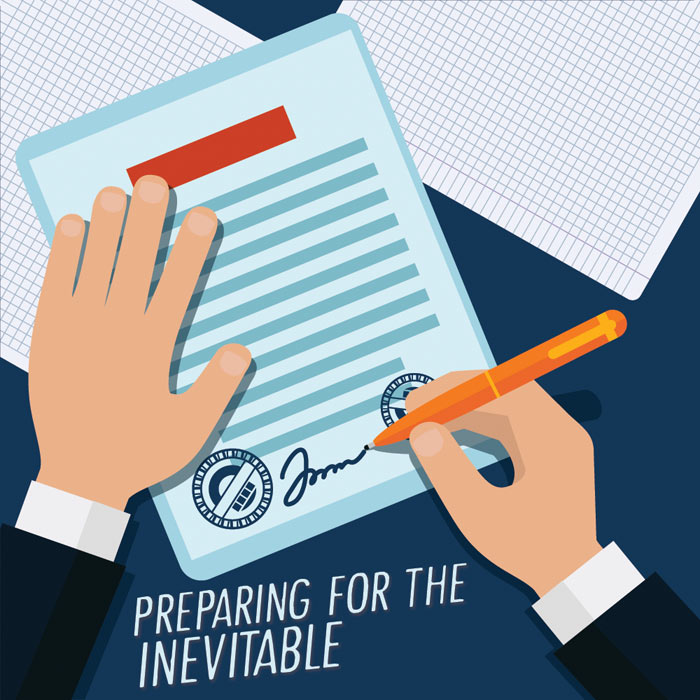
Its been said that two things in life are unavoidable: death and taxes.
Many people feel uncomfortable talking about either subject, but with wise preparation now, you can make the inevitable easier for those you leave behind. If you’re waiting to draw up a will until you buy a house or build a sizeable nest egg, think again. Estate planning sounds like something only wealthy people do, but that’s not the case.
You might only have a modest income and currently live in an apartment, but if you have a child, you absolutely need a plan for the future. Even if you have no children, you might like to leave something to a relative, friend or favorite charity. The only way to assure that this happens is to have a legal plan, and there’s no better time than the present.
Death taxes and estate taxes can apply, and these vary from state to state. Let’s say you’re a ‘snowbird’ and a legal resident of Florida but also own property in Massachusetts. When you die, the state of Massachusetts requires that property have a real estate appraisal. The appraised value of that property is the basis for the taxes your heirs will pay if you leave them the property in your will.
“There’s a plan in place by the state, whether you like it or not, so if you want direction on how your wealth is transferred, you need to hire the experts to help accomplish this. The key to estate planning is to transfer as much of your hard-earned wealth as possible to the heirs or charities you want to receive it, rather than it going to the government in taxes,” notes Kenneth McFarland, CFP, a certified financial planner.
Savvy estate planning can minimize the taxes owed by your heirs.
“I highly recommend reading the book Beyond Death and Taxes by Gregory J. Englund. It takes a family worth $10 million and walks them through a plan so that 100 percent of that wealth is transferred to the next generation. Anyone can use this plan. You’re not going by the numbers necessarily but by the strategies,” says McFarland.
“Legal documents are prepared by an attorney and are the key components of estate planning, although more than one professional will be involved in the planning process,” he adds. “You’ll need to work with an investment professional and an estate planning attorney. Depending on the extent of your holdings, you may also need a tax professional who specializes in estate taxation and an experienced life insurance agent who works with estate plans and trusts.
“The more complex your holdings and the more wealth you have, the more teamwork is required,” McFarland explains. “You can’t just create one document and think that will take care of everything. That’s why it’s a team effort.”
When it comes to those “team members,” choose wisely. Don’t just pick someone out of the Yellow Pages. You want experts who are referred to you by another trusted professional.

Where There’is A Will, There’is A Way
No doubt you’ve heard the term “probate,” but you may not be sure when it comes into play.
Probate is the legal mechanism by which the state takes assets that are in your name and transfers them to your beneficiaries after your death. The probate process verifies that your will—if you have one—is valid and handles the payment of debts and taxes, as well as distribution of your remaining property.
The court involvement of probate can be completely avoided if you take appropriate steps ahead of time. For example, if you have mutual funds, you can ask your financial planner to place a “transfer upon death” designation on the funds. This will transfer the fund to your named beneficiary. The same can be done with checking and savings accounts.
The most important place to start, however, is to have a valid, legal will.
“If you die without a will, state statutes specify who gets your property, and if you don’t leave a will, your heirs will end up fighting. You also want to minimize expenses for your loved ones,” says attorney Patricia L. Ferrari, who has worked in estate law for 32 years, handling small business and estate planning, asset protection, insurance claims and disputes.
“I am handling an estate where a brother and sister are now estranged because their mother didn’t leave a will. People can end up in turmoil fighting over heirlooms and photos that aren’t worth anything except the emotional attachment.”
Sometimes, Ferrari adds, it’s not the children of the deceased who are to blame for the disagreements. Outside influences, such as spouses, can speak up and cause trouble. Having an ironclad will can protect your family from such distressing situations after a loved one dies.
“States have strict laws about how a will has to be witnessed, so don’t think you can just write up a piece of paper, have it notarized and this will cover it,” cautions Ferrari.
What about those radio commercials about using online forms and preparing your own will?
“Estate planning is not just planning for death but also for occurrences that happen while you’re living,” explains Ferrari. “What a person needs depends on the property they own and their intended beneficiaries. It’s not ‘one size fits all,’ and those online forms are ‘one size fits all,’ so they may not fit your needs.”
Estate laws vary from state to state, so it’s important to know what’s applicable where you reside. In Florida, for instance, if you have a valid will, you can write up a list of “instructions” that designates how you want specific pieces of property distributed. If you absolutely want your granddaughter, Meredith, to have your pearl necklace or your son, Josh, to get your coin collection, put this in writing, sign and date it.Your will or this signed writing is also the perfect place to make known any burial wishes you may have. Be clear about what you want; the more specific your requests, the easier it will be for your loved ones.
“The signed paper on its own isn’t enough; you must have a will in place in order to do this,” adds Ferrari. “The will would stipulate that you are leaving a signed writing about your personal property.”
Another vital reason to have a will is to name a guardian(s) for your child(ren).
“It doesn’t happen often, but it does happen that both parents are killed in a car wreck, for example,” says Ferrari. “If you die without a will, you are denying your children a smooth transition.”
There are situations where a trust takes the place of a will. A trust takes the titles to all your assets and, upon your death, transfers those assets to your beneficiaries without going to probate. It’s crucial that everything be titled in the name of the trust for this to carry out smoothly.

Dont Skip the Basics
OK, so you need a will. What else?
Even if you are single and have few assets, at the very least you’ll want to have a living will, which is also known as an “advanced directive.” Such a document states specifically what you want and don’t want when it comes to prolonging your life should the unthinkable happen and you end up in a vegetative state or similar dire circumstance.
Ferrari strongly recommends a durable power of attorney with health care surrogate designation. This legal document includes the medical directives covered in a living will, but it also gives the person you name the ability to handle your finances, should you become incapacitated for any reason.
“If you can’t communicate with the physician, this allows the person you designated to speak with the doctors on your behalf,” Ferrari explains. “A regular power of attorney terminates upon incapacitation, but a durable power of attorney, under Florida statutes, survives incapacity and does away with the need for guardianship. This document is most important because it works while you’re living. If you become physically and or mentally incapacitated, this person can conduct your financial affairs while you are incapacitated. If it’s a long-term situation, like Alzheimer’s disease, a durable power of attorney takes the place of a guardianship being appointed by the court.”
You might be concerned that a durable power of attorney gives too much authority to someone else when it comes to your finances. State laws take this into account. In Florida, for example, it’s a felony if the person designated with durable power of attorney takes money from your account(s) for their personal use. Under state law, they have a legal duty to make financial decisions strictly for your benefit.
Beware that laws relating to durable power of attorney can vary from state to state. They can be very specific, so you should always have this document prepared by an attorney. Don’t go the online route here!
If you are married and/or have children, it’s important to have a life insurance policy in place… even if you don’t own a home or anything of significant value. The policy offers a safety net that passes outside of probate and automatically passes to the designated beneficiaries.

Keep It Up To Date
“It’s important to update your estate planning materials whenever there are significant life changes or events, such as children, marriage, divorce, changes in the valuation of businesses, property being sold or bought, etc. or in the event the government changes laws that apply,” notes McFarland.
“You are responsible for establishing an estate plan that will accomplish your goals; therefore, it’s imperative to hire competent professionals to help achieve this.”






